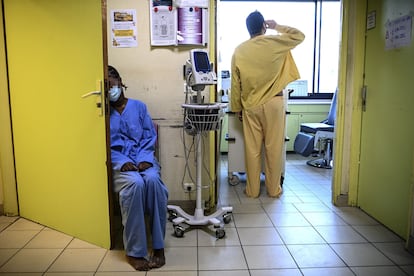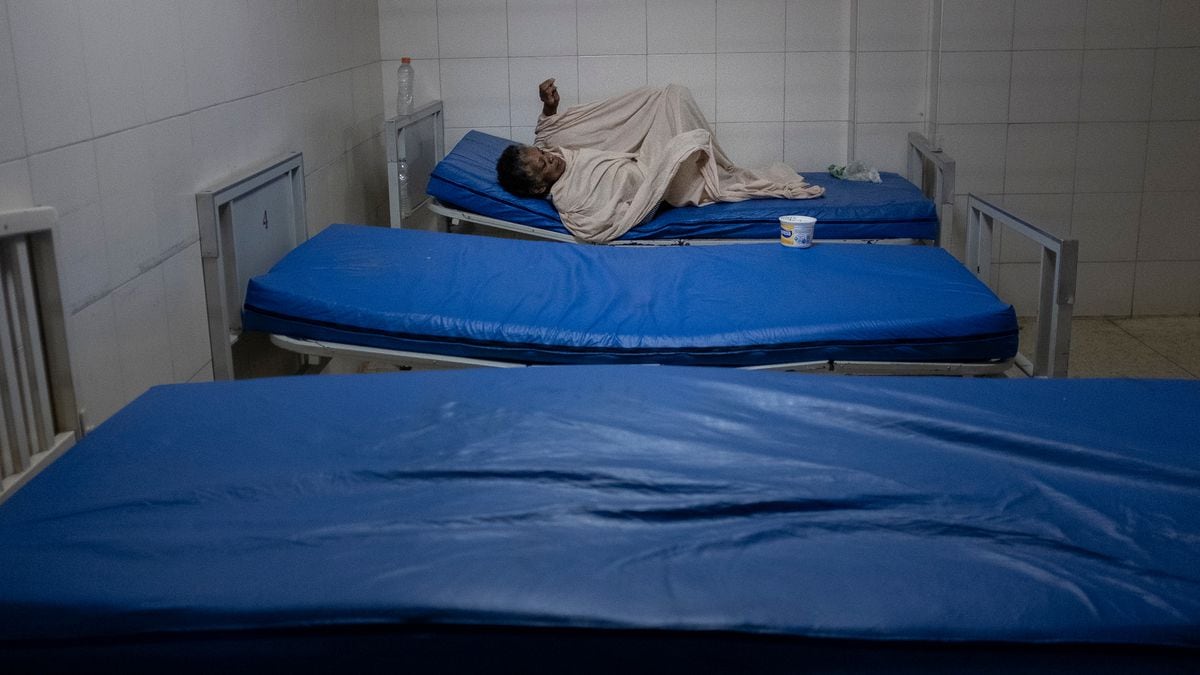The covid health crisis has shaken the foundations of the world: in just over a year, it has changed the way of socializing and the dynamics of life, it has collapsed health systems and it has put the global economy on the ropes.
But this is only the beginning.
The pandemic is, in fact, a kind of “
matryoshka
crisis
”, in the words of Pedro Gullón and Javier Padilla, authors of
Epidemiocracia
(Captain Swing, 2020): just one more piece of the Russian doll game, a crisis "covered by other crises, such as economic or ecological", and where "emergencies are going to be the new normal", they predict. For now, the coronavirus hangover will once again empty the pockets of the street and the psychological wounds of a year of pain and uncertainty will surface, the breeding ground for stoking an emergency of poor mental health that is already emerging in psychiatric consultations. Experts warn that there is a lack of resources and hands to deal with the tsunami of mental disorders that is coming upon them.
When the COVID collapsed the hospitals, in that turbulent March 2020, the mental health care of half the world stopped in its tracks.
A survey by the World Health Organization (WHO) in 130 countries found that 60% suffered interruptions in psychotherapy services for vulnerable people and, in addition, a third of the States also reported a brake in access to psychiatric treatment and in emergency interventions, such as withdrawal syndromes.
The stoppage in mental health care and the collapse of the health system - straightened out by confinements, the uncertainty of an invisible threat, the incessant trickle of deaths and poorly managed griefs, and hopelessness about an uncertain future - configured the perfect cocktail for encourage the new epidemic of poor mental health looming on the streets.
"It is already happening, but it is a silent pandemic," warns Shekhar Saxena, professor of Global Mental Health at the Harvard School of Public Health and former director of the WHO Department of Mental Health.
“People with mental health disorders suffer them in silence.
People do not recognize that this is a crisis, but it has been a crisis before the covid and it is much more so after the covid ”, he emphasizes.
A Canadian study published in the journal
Psychiatry Research
revealed, after analyzing data from 55 international studies between January and May 2020, that the prevalence of post-traumatic stress disorder reached 22%, that of anxiety reached 15% and that of depression stood at 16%.
That is, these pathologies were, respectively, five, four and three times more frequent than what the WHO usually reports.
If you want to support the development of news like this, subscribe to EL PAÍS
Subscribe
System overflowed
With primary care (the gateway to the health system) completely overwhelmed and hospitals focused on caring for covid, access to the health circuit has been complicated for mental disorders.
Patients arrive late and badly, warn psychiatrists, with very exacerbated symptoms and more complex prognoses.
Celso Arango, head of Psychiatry at the Gregorio Marañón Hospital in Madrid and president of the Spanish Society of Psychiatry, warns that the psychiatric services are approaching collapse.
“A catastrophe and a crisis have to come to undress us.
We are absolutely overwhelmed ”, sentence.
In practice, the one who has possibilities resorts to private healthcare, and the one who does not, endures.
The public system is on the limit, regrets Víctor Pérez, head of psychiatry at Hospital del Mar in Barcelona: “We have prioritized attention to serious disorders, but there are few means to treat moderate or mild cases, emotional distress, which is what which is derived from the covid.
We do not have the capacity to serve that population.
The bridge with primary care, which was the line through which mild mental illness circulated to the hospitals, has been broken because they are overwhelmed and now these people do not reach the system ”.
More information
“Whoever can, a psychologist is paid;
he who does not, holds on "
The figures confirm the impact of the pandemic on mental health
How to improve mental health after the coronavirus pandemic
Depression and anxiety are growing, serious disorders such as schizophrenia are decompensated, and eating disorders and suicide attempts emerge among young people, lists Antoni Ramos Quiroga, head of Psychiatry at Vall d'Hebron in Barcelona: " We are seeing the wave now.
In Catalonia, in 2019, there were 473 suicide attempts in minors and in 2020 there were 601. In the last six months, attempts in girls have grown by 195%.
It is our covid ”.
The pandemic has been the spark that has lit the wick of poor mental health, but the road had already been paved for years, the experts consulted agree.
According to the WHO, despite the rise in mental disorders around the world, the global average for investment in this area is 2% of public spending on health.
“Even before the pandemic, resources for mental health were much less than what was needed. Many countries allocate 3% of the health budget to this when, in reality, the mental health burden is 10%. In low- or middle-income countries, investment is below 1%, ”observes Saxena of the Harvard School of Public Health. Several elements, argues the expert, are behind this chronic under-financing: mental health care was not considered as part of the health system, but was isolated. People, Saxena argues, tend to view the money governments spend on mental health as a loss rather than an investment. According to Eurostat, mental health costs in the European Union account for 4% of the EU's GDP, that is, 600,000 million euros.There is a gap between rich and poor countries, but even among high-income countries there are differences. Arango, president of the Spanish Society of Psychiatry, points out that today Spain dedicates just 4% of investment in health to mental health, while the EU average is 5.5% and there are countries that reach 10%.
Crisis 'matryoshka'
Infrastructure and technical resources are lacking, but above all, hands. In Spain there are 11 psychiatrists per 100,000 inhabitants, almost five times less than in Switzerland (52) and half that in France (23). Germany has 27, and the Netherlands, 24. Clinical psychologists are also scarce and in 2018 there were barely 6 per 100,000 inhabitants in the public network (three times less than the European average). Regarding psychiatric beds, Spain does not reach 40 places per 100,000 people, while the European average is 75 and in Belgium and Germany there are more than 125. There is much to do, experts agree, and the challenge ahead is immense . “The covid pandemic has created a mental illness pandemic, which has increased the demand for mental health services and treatments.We need to improve access to mental health services and have innovative treatments that improve patients in a few days, ”reflects Roger McIntyre, professor of Psychiatry and Pharmacology at the University of Toronto and co-author of a research that associated the pandemic with a increased levels of psychological stress.
In that
matryoshka
world
, crises are communicating vessels: the more economic difficulties, the greater the risk of poverty and, therefore, the threat of poor mental health. Arango warns that this crisis is global: “The confinement that has caused damage to the population and deaths to which we have not mourned: there have been no funerals, no goodbyes or hugs. According to a study that we have done in the hospital, pathological grief in first-degree relatives, which is usually at 2%, has reached 25% in relatives of those who died from covid ”. On the other hand, he continues, there are the toilets themselves "touched" after facing fear and uncertainty without tools or protection. And those infected by covid will also come, those who have been in the ICU and those who have persistent covid.Not to mention the elderly who suffered dementia after confinement and all the people who wait, with a mild or moderate condition, to be treated in a collapsed primary care.
Patients at the Ville-Evrard mental health center in Saint-Denis, France, in November 2020.CHRISTOPHE ARCHAMBAULT / AFP via Getty Images
Spain looks to northern Europe to take an example. Denmark, which had suicide rates of 24 per 100,000 in the 1990s and, after an injection of resources into a community prevention program, has lowered the prevalence to 9.4, according to the OECD. In Spain, more than 3,600 people die from suicide each year (7 per 100,000), but there is still no state prevention plan. Experts are also looking for the mirror of the Netherlands, with a strong community network and links with primary care, says Ramos Quiroga, from the Vall d'Hebron Hospital; or the United Kingdom, where they have, for example, powerful psychotic first episode units, recalls Celso Arango. All countries with successful programs, the experts add, have one thing in common: they invest more in mental health.
Víctor Pérez, from the Hospital del Mar in Barcelona, is committed to prevention: “We must promote a suicide prevention plan and promote mental health from primary care so that they do not reach hospitals.
There is a lack of expert nursing and clinical psychologists ”, he warns.
The Government is updating the mental health strategy and ensures that it is "a priority" for the Executive.
United We Can is going to present a general mental health law proposal in Congress that is now in debate with civil society and the parties.
The draft of the norm contemplates that there be 18 psychiatrists for every 100,000 inhabitants and a suicide prevention protocol.
An eye on schools
In addition to resources, the great challenge of mental health involves a multidisciplinary, transversal and integrated approach in the public health system. “In advanced countries, the health system is in the schools. Here health, education and social services are watertight compartments. We do not have a global vision ”, laments Arango. 50% of mental disorders appear before adulthood and, nevertheless, protests the psychiatrist, Spain is the only country in the European Union without the medical specialty of child and adolescent psychiatry. Precisely, the Council of Ministers approved this Tuesday the creation of this title and in the coming months the training programs will be developed, which will last for five years.
In any case, care must go beyond psychiatric specialists and training of general practitioners and nurses will need to be strengthened to recognize and treat common mental disorders, agrees Shekhar Saxena of Harvard. As already happened during the pandemic, new technologies can also be an ally to respond to the growing demand, points out Víctor Pérez, who believes that 25% of the attention may be telematic, although the first visits must be in person . "Social contact and face-to-face is important," he clarifies.
Experts insist on the need to encourage prevention strategies. Canadian psychiatrist Roger McIntyre is committed to "improving people's resilience." For this, he assures, a robust and multidisciplinary social structure is necessary, with programs that reduce food, economic and housing insecurity. Celso Arango, from Gregorio Marañón, calls for a more humane care, with, for example, community nurses who go to the homes. “There is a lack of centers for young people that are nice, not hospitals. Garages where they play billiards and there is a social worker to help them, to see the doctor without a gown, "he proposes.
In this field, social prescription also plays a role, which consists of resorting to activities in the community environment to improve the health of the patient and avoid the medicalization of daily life. “People also need to be prescribed more social activities, physical activities, a better diet. For many, finding a job is an important part of their treatment as well, ”says McIntyre. It is about combating potential health problems, such as loneliness, with community initiatives, such as participating in the neighborhood book club, for example. Catalonia is one of the communities that has implemented pilot programs of social prescription to reduce isolation, increase activity and modify habits.
Psychiatrists also demand financial resources to support patients and their caregivers. Like the whiting that bites its tail, poverty breeds poor mental health, but mental disorders can also lead to poverty. Depression will be the leading cause of disability in 2030, recalls psychiatrist Víctor Pérez, and if the disorder debuts at a very young age, patients are impoverished: they have not had time to contribute and obtain low pensions. In addition, the economic burden of the disorders reaches the caregiver, who is usually a relative, due to difficulties in reconciling work with patient care or lack of resources. "One of the great dilemmas of parents with autistic children is what will happen when they are not there," sums up Ramos Quiroga.
The other big open front, however, is the stigma surrounding mental health. Starting with the institutional prejudices that, in Arango's opinion, the lack of investment in mental health implies. "We are not diseases with legs," protests Mercè Torrentallè, vice president of Obertament, an entity that fights against stigma. The activist denounces the lack of gender perspective in care and the difficulties of women with mental disorders to find a job, for example. According to McIntyre, women are at higher risk of developing depression, probably because they are more exposed to risk factors, such as having suffered physical and sexual trauma, suffering from ailments, such as obesity, or pregnancy itself.
There are many pending tasks, but the mental health challenge cannot be postponed, Saxena advises: “The biggest mistake with mental health is ignoring it.
And the cost of doing that is very high ”.
Subscribe here
to the weekly Ideas newsletter.











/cloudfront-eu-central-1.images.arcpublishing.com/prisa/KMEYMJKESBAZBE4MRBAM4TGHIQ.jpg)



